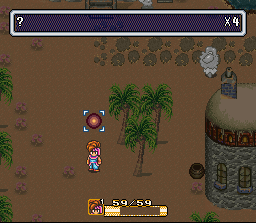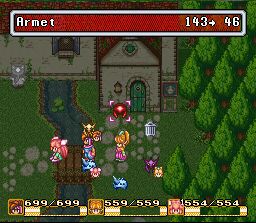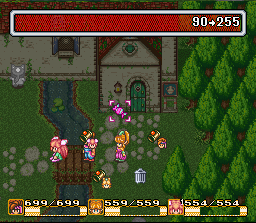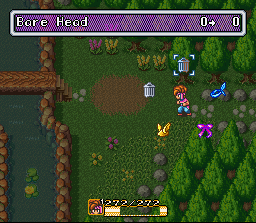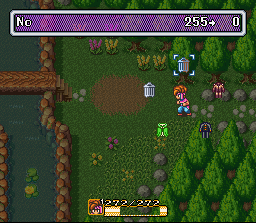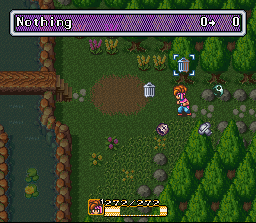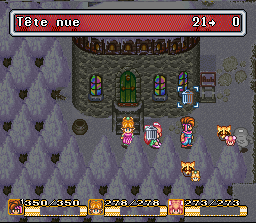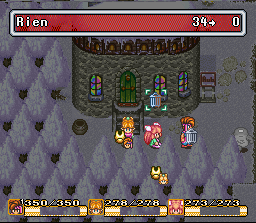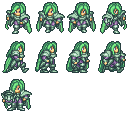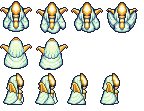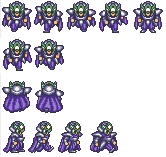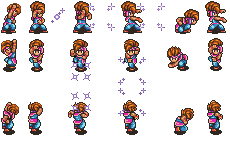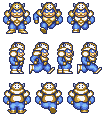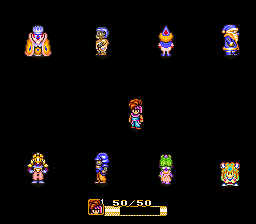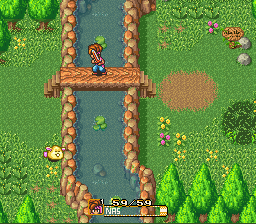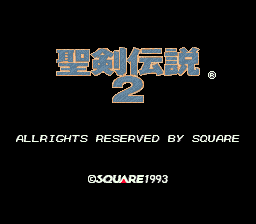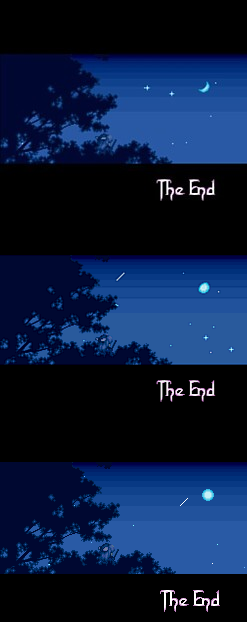Secret of Mana (SNES)
| Secret of Mana |
|---|
|
Also known as: Seiken Densetsu 2 (JP)
|
Secret of Mana is one of Square's most well-regarded SNES offerings. A sequel to Final Fantasy Adventure on Game Boy, it's an action RPG for up to three players featuring bright, colorful graphics and quirky monsters, and one of the best soundtracks on the SNES.
The game's also known for its infamously troubled production, in which it started life as a launch title for a planned CD drive add-on for the SNES, only to have to be significantly cut down to fit on a much smaller cartridge when the partnership between Nintendo and Sony that said CD drive hinged on spectacularly fell apart. The outcome of that partnership's failure eventually led to the creation of the PlayStation, a console Square would eventually jump ship to, thanks in part to the production problems with Secret of Mana.
Contents
- 1 Sub-Page
- 2 Unused Items
- 3 Unused Sprites
- 3.1 White Sprite
- 3.2 Neko Back and Walking Frames
- 3.3 Watts Unused Tile
- 3.4 Sage Joch Walking Frames
- 3.5 Scorpion Leader Unused Tile
- 3.6 Dyluck Walking Frames
- 3.7 Geshtar Unused Frames
- 3.8 Unused Character
- 3.9 Sheex
- 3.10 Thanatos Walking Frames
- 3.11 Elinee Without Hood
- 3.12 Truffle Walking Frames
- 3.13 Toppled Snowmen
- 3.14 Casting Boy
- 3.15 Laughing Boy and Girl
- 3.16 Unused Enemy Sprites
- 3.17 Mysterious NPC
- 3.18 Unused Boss Sprites
- 4 Unused Music
- 5 Debug Room
- 6 Unused Text
- 7 Hidden Programmer Credit
- 8 Regional Differences
- 9 Oddities
Sub-Page
| Prerelease Info |
Unused Items
Mana Sword
Barring glitches or cheat codes, it's impossible to get the sword up to Level 9, unlike every other weapon. However, if you do get an extra Sword Orb by whatever means, it can be upgraded, and comes complete with an icon that's never otherwise seen (and a whopping 127 attack power, when the next strongest weapons have only 56). Normally this sword is gained only in the final battle by having both the Girl and the Sprite cast Mana Magic on the hero, but it's applied more or less the same way as the elemental "Saber" spells, and thus doesn't change anything on the menu.
Be warned, however, that even if you do cheat your way into possession of this sword, it won't deal extra damage to the Mana Beast. In fact, if you cast Mana Magic on the sword, it will become the Spike Knuckle, the Level 1 glove, after the magic wears off.
Unknown Item
There exists in the ROM an unused, dummied item that acts like a healing item upon use, but has no apparent effects. It is possible, judging from the way the object looks, that it was meant to be a sprite to show the Weapon Orbs in your inventory.
Ruby Armet
The Ruby Armet is a helmet for the Girl with a defense of 46. Mandala seems like the likely place where this helmet would have been sold since it lacks a helmet for the Girl and its stats are in the range of the Circlet. Also starting from Todo Village, Candy is no longer being sold in shops and are replaced by Chocolate (except Tasnica and a few Neko shops). It might have been a developer oversight by placing Candy instead of Ruby Armet in the shop menu. Use Pro Action Replay (PAR) code 7ECC240C to put it in a helmet slot.
"Max Candy"
Use Pro Action Replay (PAR) code 7ECC3C3F to put this item in an arm protection slot (or hex 3F via editor). It has no name and looks like a Candy. It provides the following when equipped:
Defense: +255 Strength: +5 Agility: +5 Constitution: +5 Intelligence: +5 Protection: Literally protects against all status effects - Includes: Slow, Unconscious, Frosty, Stone, Confused, Balloon, Pygmy, Barrel, Moogle, Poison, Burning and Death. - Barrel means players cannot use "Barrel" from the inventory wheel. - Death protects players from spells(?)/chests that cast death on their target. They still die when their HP reaches zero.
Bare Head/Body/Arm
Value 00 for the armor modifier code gives a miscolored trashcan with the description "Bare Head" (translated from French here), values 15 and 2A give similar items with the descriptions "No" and "Nothing". These might have been intended to remove helmets, armors, and arm protections respectively.
Note: The Item hex range is 00 to 3F. +40, +80, and +C0 is added to the byte value if a character has it equipped.
Unused Sprites
White Sprite
Using Pro Action Replay (PAR) code 7EE18056 will change the Boy into a completely whited-out Sprite. There exist several duplicates of the Boy, Girl, and Sprite in the character data, some with alternate palettes (such as for the fight against the clones in Sage Joch's cave), but this white palette is unique to the Sprite and not used anywhere.
Neko Back and Walking Frames
The Pro Action Replay (PAR) code 7EE18099 will change the Boy into Neko. Neko never moves from any place where you find him standing in the game, but with this code you can see that he has unused walking forwards and backwards sprites. He will blink his eyes as he walks. This is also the only way to see him from behind.
Watts Unused Tile
Watts has an unused tile. The right sprite shows how it could be used. The main difference is his beard color.
Sage Joch Walking Frames
The Pro Action Replay (PAR) code 7EE180A3 will turn the Boy into Sage Joch and you will see that he has walking forward sprites. Joch never moves from the spot he is standing on during normal game play. However, it's possible to activate this animation by standing behind him and talking to him. Characters are programmed to turn and face you when you talk to them from behind, but since Joch has no back view, his walking animation is called up in place of it. This was probably an oversight on the programmers' part.
Scorpion Leader Unused Tile
The Scorpion leader has also an unused tile. The right sprite shows how her head would look like, no match could be found with body tiles. Her hair is different and her cape seems closed over her shoulder.
Dyluck Walking Frames
Most NPCs have a complete set of walking frames, but some do not use all of them. Here, Dyluck's downwards walking frames are unused.
Geshtar Unused Frames
Geshtar has downwards and sideways walking frames, which are unused, but no upwards walking frames. On the other hand, he has an alternate downward standing sprite, holding the Mech Rider helm. This can be seen by using the Pro Action Replay (PAR) code 7EE180B1 and walking upwards.
Unused Character
The Pro Action Replay (PAR) code 7EE180B3 will change the Boy into an unused character in a white cloak. This character is right between Fanha and Sheex in the character data, so he(?) was most likely meant to be another servant of Emperor Vandole.
Sheex
Sheex uses downwards walking frames, but extra tiles can be seen around the sprite. Moreover, the shoulders seem off for two frames. Using the available tiles, the sprites can be corrected. In addition, the upwards walking frames are unused.
More interesting is another head for Sheex, with a helm. There is a version available for all his frames (first line is as observed in the game with extra tiles cleaned, second line corresponds to corrected sprites). The white spot on the helm makes it look unfinished.
Thanatos Walking Frames
Like other characters, Thanatos has unused frames, sideways in this case.
Elinee Without Hood
The Pro Action Replay (PAR) code 7EE180BA will turn the Boy into the witch, Elinee. Slide left or right to activate an unused sprite of Elinee without her hood. There is an additional sprite without her hood and with her mouth open. This can be seen by bringing her to an area with enemies, but may freeze the game.
After she is reformed, the hooded witch's sprite is simply replaced with an elderly female villager sprite instead of using these, presumably so she can randomly walk around the room after the conversation and during the ending. If there was another location where the sprites could be used, it's long gone from the final game, barring something obscure like Elinee being initially unhooded when encountered outside the boss room or something.
Elinee also doesn't have sprites for moving upwards, so when she walks north after initially talking to her, she will do the hand-waving animation instead.
Truffle Walking Frames
All walking frames of Truffle are unused. It is interesting to note that his sprites are obtained by adding a crown and moustache to the regular mushrooms sprites.
Toppled Snowmen
The Pro Action Replay (PAR) code 7EE180EE turns the Boy into a Snowman. Holding up or down reveals an unused sprite of the Snowman crumbling apart. In the first game you could destroy snowmen after turning enemies into them with the Ice spell. How this would have exactly worked in the sequel is unknown, unless it was simply a damaged animation, which would make the status much like Balloon or the Flame status effect. As it is, both enemy and ally snowmen cannot be hurt until the status effect wears off on its own.
The Pro Action Replay (PAR) code 7EE180EF turns the Boy into the midget version of the snowman. It, too, has an unused frame of it slightly toppled over.
Casting Boy
Use Pro Action Replay (PAR) code 7EE58001 to turn the Sprite into the Boy. Then cast a spell. The animation is available! Note that some sprites may be used by other animations.
Laughing Boy and Girl
Only the Sprite laughing animation is used in-game. Use Pro Action Replay (PAR) codes 7EE02F25 and 7EE22F respectively to display the animations.
Unused Enemy Sprites
![]() This may have been intended as a hurt animation.
This may have been intended as a hurt animation.
![]() Some monsters have such fun sprites, but this one is unused.
Some monsters have such fun sprites, but this one is unused.
 Rarely-used hurt and unused attack sprites for the fish monsters. The hurt sprites are used, but will very rarely be seen during a normal playthrough as the fish have to be hurt to 15hp or below (at least for the Iffish near the Water Palace). Once that is done and they try to start their next attack action, they will permanently go into a catatonic state switching between the two hurt sprites.
Rarely-used hurt and unused attack sprites for the fish monsters. The hurt sprites are used, but will very rarely be seen during a normal playthrough as the fish have to be hurt to 15hp or below (at least for the Iffish near the Water Palace). Once that is done and they try to start their next attack action, they will permanently go into a catatonic state switching between the two hurt sprites.
![]() These unused eyes for the Mimic Box would probably have been overlaid on a chest sprite.
These unused eyes for the Mimic Box would probably have been overlaid on a chest sprite.
![]() Some unused sprites for Nemesis Owl.
Some unused sprites for Nemesis Owl.
![]() The body parts might have been intended as sleeping sprites, but they cannot be put to sleep. The tails may or may not match the bodies.
The body parts might have been intended as sleeping sprites, but they cannot be put to sleep. The tails may or may not match the bodies.
![]() An alternate hurt or sleeping sprite.
An alternate hurt or sleeping sprite.
 Unused sprites for Weepy Eye and Whimper. While the Whimper enemy does drop tears occasionally when in an "opening" idle animation before it is aware of the player, these frames don't play; only the teardrops falling are animated.
Unused sprites for Weepy Eye and Whimper. While the Whimper enemy does drop tears occasionally when in an "opening" idle animation before it is aware of the player, these frames don't play; only the teardrops falling are animated.
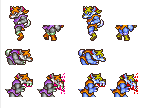 Several unused sprites and parts of sprites for Werewolf and Wolf Lord, including a bloody bite.
Several unused sprites and parts of sprites for Werewolf and Wolf Lord, including a bloody bite.
 The regular wolves also have an unused sprite, maybe intended as a preparation for a pounce or a howl.
The regular wolves also have an unused sprite, maybe intended as a preparation for a pounce or a howl.
Mysterious NPC
You cannot use 7EE180xx codes to turn the Boy into this NPC (possibly a soldier or bandit, given his clothing). Its tiles are present in the ROM near the big-headed villager, which the Boy turns into for two consecutive values of the code. Maybe one of them was supposed to point to this one?
Note that the palette of the Pandora guard was chosen for aesthetic reasons, but the actual palette might be found somewhere in the ROM.
Unused Boss Sprites
![]()
Neither Mantis Ant nor Metal Mantis turn their head like this; they always face directly down.
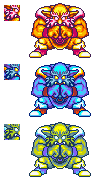
An unused part of a sprite for the Gigas bosses. On the right is how the full sprite would probably look like.
![]()
Some unused sprites for the central eye of the Wall bosses contracting.
![]()
Two frames of animation for the wheel of Kilroy and Kettle Kin, with an oblique orientation. Sadly, no chainsaw was found in RAM for the PAL version...

It would seem that Spring Beak or Axe Beak could have been able to run or kick. Their only moves in the game are jumps, and the feet stay the same.
![]()
According to this sprite part, Minotaur or Gorgon Bull could have fallen over, or maybe it is some sort of kick... It does not really fit with the rest of the sprites.
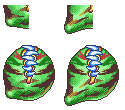
Unused parts of the Aegagropilon sprite (actually on a background layer). On the bottom is how it would probably look like assembled. It seems that Aegagropilon could eat characters, like some other bosses...
![]()
An unused hand for Hexas, it would fit on the upper arms.

These are present with the sprites for the Dragon bosses. The shattering ice block was certainly made for Snow Dragon and the fireball for Red Dragon. It is not clear what the third object would have been used for, or how to assemble it.
Unused Music
A pair of rather dramatic fanfares that are never heard at any point in the game. They don't sound much like the other music in the game, either, so it's pretty well impossible to place them anywhere.
Debug Room
Start a new game or load a saved game, then turn on the Pro Action Replay (PAR) code (7E00DC0F) and exit the screen to enter the Debug Room.
Unfortunately, none of the people in the room seem to do anything except for the King. Talking to him starts the Intro sequence again, sending you straight back to the waterfall near Potos Village.
Unused Text
Medicine
Text for some kind of medicine, possibly intended to restore HP/MP.
English:
Drink this medicine! It'll fix ya right up!
Japanese:
やどやのかわりに、タスマニカ めいぶつ、パチパチドリンクじゃ!ひとくちのむだけで回復する!
Translated version of the above:
This is Tasmanika. It's a special drink that's bursting with energy you can use instead of staying at an inn! Just one sip'll restore you to full health!
Diary Entry
An incomplete diary entry that refers to the fake emperor. The parts in parentheses appear in the actual dialogue.
English:
(Unfinished diary entry) ...My cover's been blown... Some monster's using the Emperor's body to (Text suddenly stops) [PLAYER]:What does this mean?
Japanese:
(かきかけのにっきがおちている) 「[・・]ダメだ、ついに見つかって しまった[・・]。皇帝はニセモノだ! 魔者が 皇帝になりすまし[・・][・・] (にっきは ここでとだえていた)『どういうことだろう[・・]
Translated version of the above:
(A diary is lying on the ground) "...It's no good. I've been found out... The Emperor is a fake! Some monster has taken his place..." (That's the last entry) [PLAYER]: I wonder what it means...
Hidden Programmer Credit
While your character is wielding a weapon, hold L + A on Controller 1, press R 39 times, release L + A, then press R once. The game will freeze, "NAS" will appear on your status bar for less than two seconds, vanish, and the game will resume normally.
The letters are a reference to Nasir Gebelli, the game's programmer.
Regional Differences
Opening Logo
| Japan | USA | Europe |
|---|---|---|
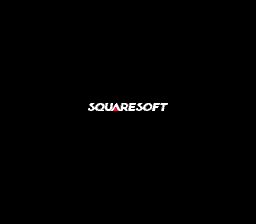
|
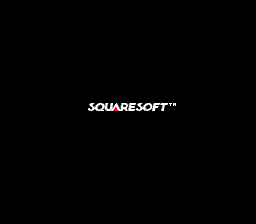
|
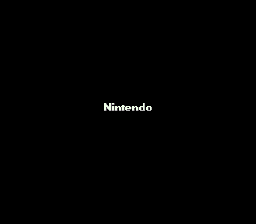
|
The opening logo was given a trademark in the North American version and since the game was published by Nintendo in Europe, the logo was replaced.
Title Screen
| Japan | Japan (background) | USA | Europe |
|---|---|---|---|
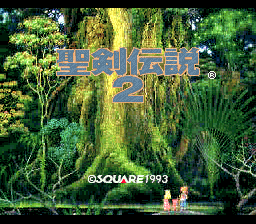
|
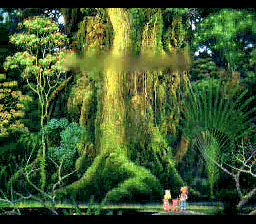
|
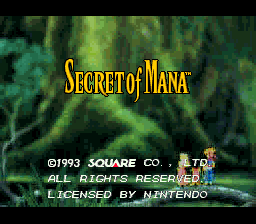
|
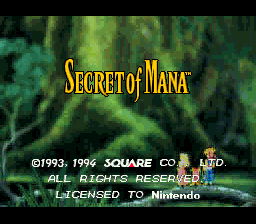
|
For some reason, the title screen in the international versions uses a blurrier, more zoomed-in version of the Japanese title screen art. As a result, much less of the Mana Tree and surrounding foliage are visible.
(This may have been done because of a sizable blurred area towards the top of the graphic. The Japanese title graphics cover this blur up completely, but the English title is too small to hide it from view.)
The European versions updated the copyright info and changed "LICENSED BY" to "LICENSED TO" and replaced "NINTENDO" with a logo.
The Japanese version has an additional bit of Engrish text before the intro text that's not included in the international versions due to that info being displayed elsewhere.
Intro Text
| Japan | USA/Europe |
|---|---|
| IN A CALAMITY, PEOPLE AWAITED FOR A BRAVE WITH THE SWORD. THE SWORD REVEALED THE POWER OF ITS TRUE NATURE TO RETRIEVE THE PEACE. EXCALIBUR, KUSANAGI, AND ALL THE OTHER SWORDS TALKED IN MYTH, LEGEND, AND SAGA... PEOPLE NAMED THOSE SWORDS IN MANY WAYS. BUT... THEY ALL MEANT ONE THING. THE ONE AND ONLY... THE SWORD OF MANA. |
DARKNESS SWEEPS THE TROUBLED LAND, AS MANA'S POWER FADES... PEOPLE AWAIT A HERO WHO WILL WIELD THE SWORD... EXCALIBUR, HERALD, GIGAS... THE BLADE HAS HAD MANY NAMES, FOR IT HAS BEEN CELEBRATED IN MYTHS AND LEGENDS THROUGHOUT TIME. BUT ALL OF THESE SPEAK TO JUST ONE WEAPON: THE SWORD OF MANA. |
The intro in the Japanese version uses poor English that was rewritten and condensed for the North American release.
Warp Portal
| Japan | International |
|---|---|
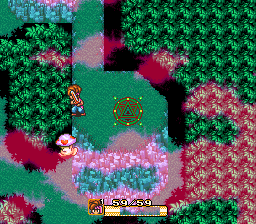 |
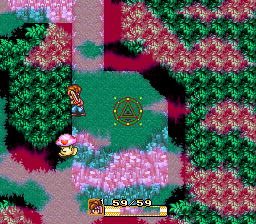 |
Due to Nintendo of America's policies on religious imagery, the warp portals were altered.
Altered Boss
| Japan | International |
|---|---|
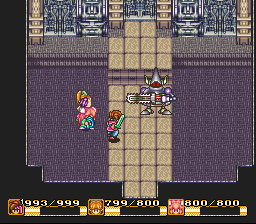 |
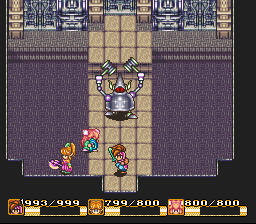 |
For whatever reason, the robot "Kettle Kin" was altered in the North American version. In the Japanese version it's equipped with a chainsaw, but in the North American version it's just a palette swap of Kilroy with different stats.
| Japan | International |
|---|---|
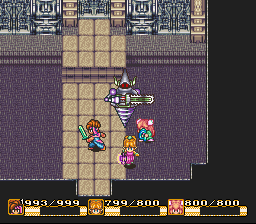 |
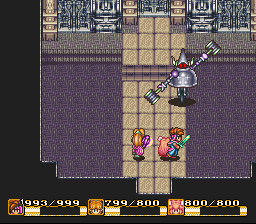 |
In the second phase, its legs are replaced by a drill instead of a wheel.
Gnome Magic
| Japan | International |
|---|---|
The Earthquake spell, known as Earth Slide in the English versions, was given a completely different icon. The icon is a catfish. In Japanese folklore, Namazu is a giant catfish that can create powerful earthquakes.
Colors
| Japan/Europe | USA | France/Germany |
|---|---|---|
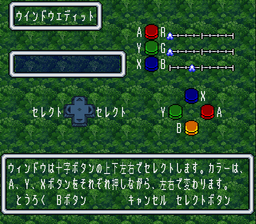
|
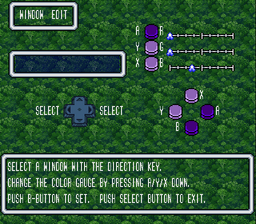
|
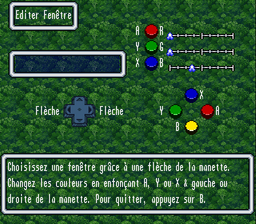
|
The colors on the buttons in the Window Edit and Controller Edit menus were changed to reflect the North American SNES controller. The French and German versions didn't require such a change, but received altered palettes and button graphics anyway, including the L and R buttons (not seen here). Due to palette sharing, these changes also affected a few other screens, as seen below.
| Japan/France/Germany | USA/Europe |
|---|---|
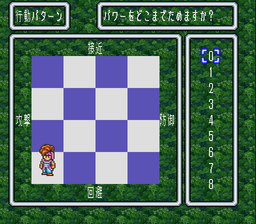 |
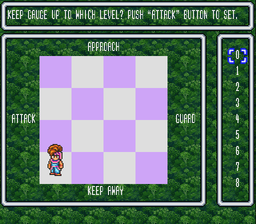 |
The addition of a lavender palette for the North American buttons also affected the action grid. These changes were (perhaps unintentionally) carried over to the European version.
| Japan/USA/Europe | France/Germany |
|---|---|
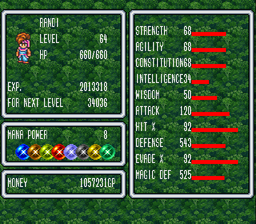
|
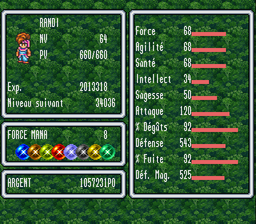
|
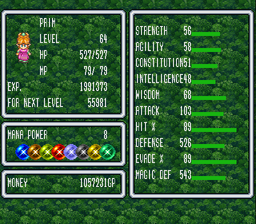
|
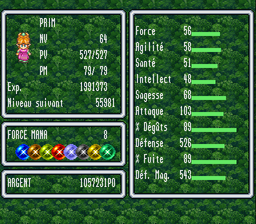
|
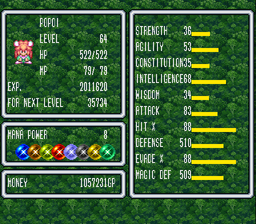
|
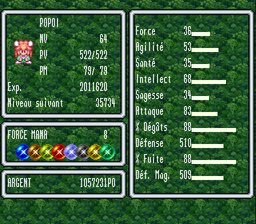
|
The slight changes made to the button palettes in the French and German versions also affected the bars on the status screen.
Skills
| USA | Europe/France/Germany |
|---|---|
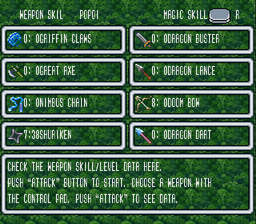
|
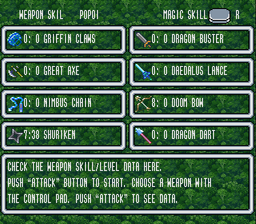
|
For better readability, the European versions added a much needed space between the skill level and the names of the weapons and spells. However, the typo "Skil" still remained in the English versions. In addition, the European versions received a thicker font.
Font
| USA | Europe/France/Germany |
|---|---|
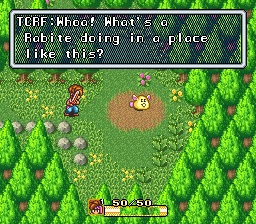
|
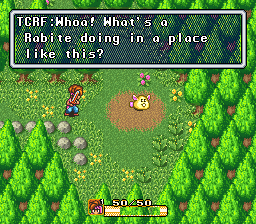
|
For better readability, the main font in the European versions received a facelift as well.
Oddities
Scrapped Alternate Events
To recruit the Girl normally, the Boy has to either be captured by the goblins, or meet her in front of a certain wolf boss. However, a third method was planned, but apparently left unfinished.
By not talking to any of the soldiers (including the Girl's lover) in front of the Water Palace, then returning to the castle, the goblin cutscene is never triggered. In Pandora's tower, the Girl won't join you, instead escaping. You can access a room with the Girl's pretendant (a palette swap of Elliot). You can then find her again with her father in her house in Pandora, although she abruptly disappears when talked to, hinting at the unfinished nature of this event. In the US version, talking to her father will crash the game as he says her name (which isn't entered yet); in the French and German versions, he simply says "..."
The Ending Moon
For some reason, the moon at the very end of the game changes depending on the last loaded game file's checksum (which is effectively random). This is not at all representative of how well the playthrough went, so this probably wasn't the intent (using the game file's save counter instead would make far more sense, giving you a rating of how "risky" you played).
The World of Mana series
| |
|---|---|
| Game Boy | Final Fantasy Adventure |
| SNES | Secret of Mana • Trials of Mana |
| PlayStation | Legend of Mana |
| PlayStation 2 | Dawn of Mana |
| Game Boy Advance | Sword of Mana |
| Nintendo DS | Children of Mana |
| Windows | Secret of Mana • Trials of Mana |
| PlayStation 4 | Trials of Mana |
| Nintendo Switch | Collection of Mana • Trials of Mana |
| Related Games | |
| SNES | Secret of Evermore |
- Pages missing developer references
- Games developed by Square
- Pages missing publisher references
- Games published by Square
- Games published by Squaresoft
- Games published by Nintendo
- SNES games
- Pages missing date references
- Games released in 1993
- Games released in August
- Games released on August 6
- Games released in October
- Games released on October 3
- Games with hidden developer credits
- Games with unused graphics
- Games with unused items
- Games with unused music
- Games with unused text
- Games with debugging functions
- Games with regional differences
- Pages with a Data Crystal link
- World of Mana series
Cleanup > Pages missing date references
Cleanup > Pages missing developer references
Cleanup > Pages missing publisher references
Games > Games by content > Games with debugging functions
Games > Games by content > Games with hidden developer credits
Games > Games by content > Games with regional differences
Games > Games by content > Games with unused graphics
Games > Games by content > Games with unused items
Games > Games by content > Games with unused music
Games > Games by content > Games with unused text
Games > Games by content > Pages with a Data Crystal link
Games > Games by developer
Games > Games by developer > Games developed by Square Enix > Games developed by Square
Games > Games by platform > SNES games
Games > Games by publisher > Games published by Nintendo
Games > Games by publisher > Games published by Square Enix > Games published by Square
Games > Games by publisher > Games published by Square Enix > Games published by Square > Games published by Squaresoft
Games > Games by release date > Games released in 1993
Games > Games by release date > Games released in August
Games > Games by release date > Games released in August > Games released on August 6
Games > Games by release date > Games released in October
Games > Games by release date > Games released in October > Games released on October 3
Games > Games by series > World of Mana series
